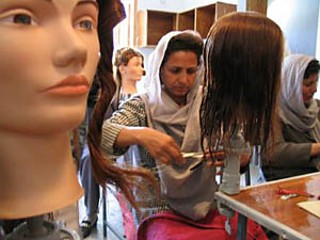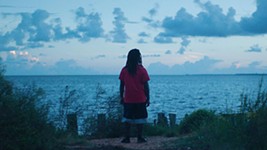Maybe She's Born With It
Texas Documentary Tour: Liz Mermin's 'The Beauty Academy of Kabul'
By Anne S. Lewis, Fri., Oct. 29, 2004

Once you grok to the subject of this film – the opening of a beauty school for Afghan women, midwifed by a group of Western beauticians with funding from the U.S. fashion industry – you might be excused for thinking that the women of post-Taliban Kabul had about as much need for a beauty school as a fish for a bicycle. That, in fact, was filmmaker Liz Mermin's (On Hostile Ground) reaction when she read in The New York Times about the upcoming Beauty Without Borders project and wondered whether anyone was making a film about this. "At first I was quite dismissive," recalls Mermin, "thinking it was a crazy idea of what Afghanistan needed." Then she met two exiled Afghan women, who were also attached to the project, who had been forced, decades earlier, to abandon careers in medicine and social work and flee their country's upheavals for New York. Their English was poor, but hairdressing was one of the few skills they had, and they were able to survive and become quite successful in the U.S. "They had this sense that learning to become a hairdresser was something that could pull you out of a really bad situation – an available career when there was nothing else," Mermin explains.
And, it turns out, the beautification of Kabul women was big business: flourishing all along under burkas and underground in salons even during the Taliban repressions. (In fact, it was rumored, says Mermin, that the Taliban families lived more exciting personal lives: "We always heard about how hypocritical the Taliban were with their values, that they drove these nice cars and had these dinner parties and did things that no one else was allowed to do.") The Kabul woman's need for hairstyling and make-up, Mermin discovered during her 10-week shoot in 2003, has always been driven by a never-ending calendar of wedding, engagement, and huge family parties, for which women spend hours primping. (Their style icons, Mermin points out, are not Hollywood but Bollywood, featured on posters all over town.)
Mermin's film, shot with a crew of three other women, is a combination of fly-on-the-wall footage from the beauty school classroom and on-camera interviews with selected students in their homes and salons. It is a fascinating look at a war-torn area we know only superficially from news headlines. Some of the best scenes are the unintentionally hilarious: the blank stares of the student body when an American instructor announces, in peppy cheerleader mode, that Frederik Fekkai himself has donated the scissors they'll be using to cut hair, and, later, as they go through the motions of learning the New Age-y relaxation-meditation exercises that their teacher tells them fashionable New York women use to revive and recenter themselves in the middle of their busy days. And then there's the palpable who-dat? when the Anna Wintour prize for excellence is awarded at the final banquet.
Austin Chronicle: You went into filming this project with a bit of skepticism. How did you come away feeling?
Liz Mermin: That it has done a wonderful thing for the 20 women that were in the program: the opportunity to be a student and really focus on something and get out of the daily ridiculous pressures that they had to deal with and have room for themselves and to develop some self-confidence. On the one hand, this sounds sort of secondary in the context of a post-war society, but given how much had been taken away from women psychologically in the past 20 years, between civil war and the crazy Taliban restrictions, I think that having this opportunity to build up self-confidence made a huge difference in helping them move forward in their lives. While I wouldn't have thought this was the most obvious way of doing it, and it wasn't a panacea for the problems there, it was a small-scale aid project, and I was very moved by how much it seemed to give these people.
Though there were certainly times during the shoot, when I'd be having dinner with these Western journalists who were working on stories, say, about developing the new constitution or de-mining, that I had moments where I was sort of embarrassed with the project we were tracking and find myself saying, "Well, it's not my project, I didn't start the school." But I felt bad about being embarrassed because this group of women was just going over there doing what they knew how to do and it was an impressive thing for them to have done. They took time off from their jobs, they were volunteering and went over there and did something that seemed sort of dangerous and crazy for no particular reason, other than they believed in it.
There was a lot of anxiety about the Taliban coming back or things getting worse. I made a decision to limit the political rhetoric in the film, because I didn't want that to be what it was about, but when I screen the film, I try to get across the point that the story in Afghanistan is far from over.
AC: What surprised you the most about Kabul?
LM: How lively and friendly and engaged the people we met were. Knowing what they've been through, I expected things to be much more somber and for women to be much more defeated. We spent a lot of time before rolling the camera, just hanging around so the women could get used to us. And the women were so bold about asking us questions and inviting us home with them: They were curious about who we were and open and friendly and not wanting to talk about what they'd been through in the past. They wanted to talk about what they wanted to do with their lives, getting married, etc.; they didn't want to dwell on the horrors of the past.
AC: How does the Kabul woman's attitude toward style and make-up compare to ours?
LM: Similar. There were women who had no interest in it at all, and women who were obsessed with comparing different kinds of eyeliner and this and that, and clearly more of the latter. Their model for beauty – I keep getting comments that this is a kind of cultural imperialism, Americans going in and telling women how they should look – my response is that their sense of their own style and what they like and don't like is very strong. When they get done up for weddings, it's glitter and updos, really thick eye make-up; when they were teaching subtlety in eye make-up application at the school – that did not take hold. They told us they liked it for us and liked the idea that day to day, you could get away with using just a little bit of make-up. The women I met always wore make-up to work, though there are certainly women who didn't. We (the crew) wore little or no make-up and were constantly asked why we weren't wearing more. Women in professional settings were quite fashionable and quite done up, and their expectation was that since we were professionals from abroad, that we'd be dressed better than we were.
AC: What other observations did you come away with concerning the nexus between American and Afghan women?
LM: The similarities struck me more than the differences between the two: the differences having to do with what's available to them, the choices they have or don't have about who they can marry, what they can do with their lives, and how controlled they still are by political fear of instability. As far as similarities go, they wanted the same things that we want in terms of professional opportunities, being able to travel and see things, and go to school, but there are real cultural barriers to that, and that will take a long time to change. It's harder to make that kind of change – you can go in with the rhetoric about how you have to stand up to the men, but it's hard to change a culture; it's a slow process. They're doing a good job of getting started, but it will take a while.
There was a lot of anxiety about the Taliban coming back or things getting worse. There's sort of a dark ending to the film because there's a lot of uncertainty about what's going to happen. There's a lot of hope and enthusiasm, but the flip side is a very visceral kind of fear: No one's out at night, there are guns everywhere, and no one knows who will be in charge tomorrow. ![]()
The Beauty Academy of Kabul screens as part of the Texas Documentary Tour on Wednesday, Nov. 3, 7pm, at the Alamo Drafthouse Downtown (Fourth & Colorado). Liz Mermin will conduct a Q&A after the screening. Tickets are $4 for current Austin Film Society members and new members joining before the screening, as well as students, and $6 for nonmembers. They are available only through the Austin Film Society at www.austinfilm.org or at the venue one hour prior to screening.










